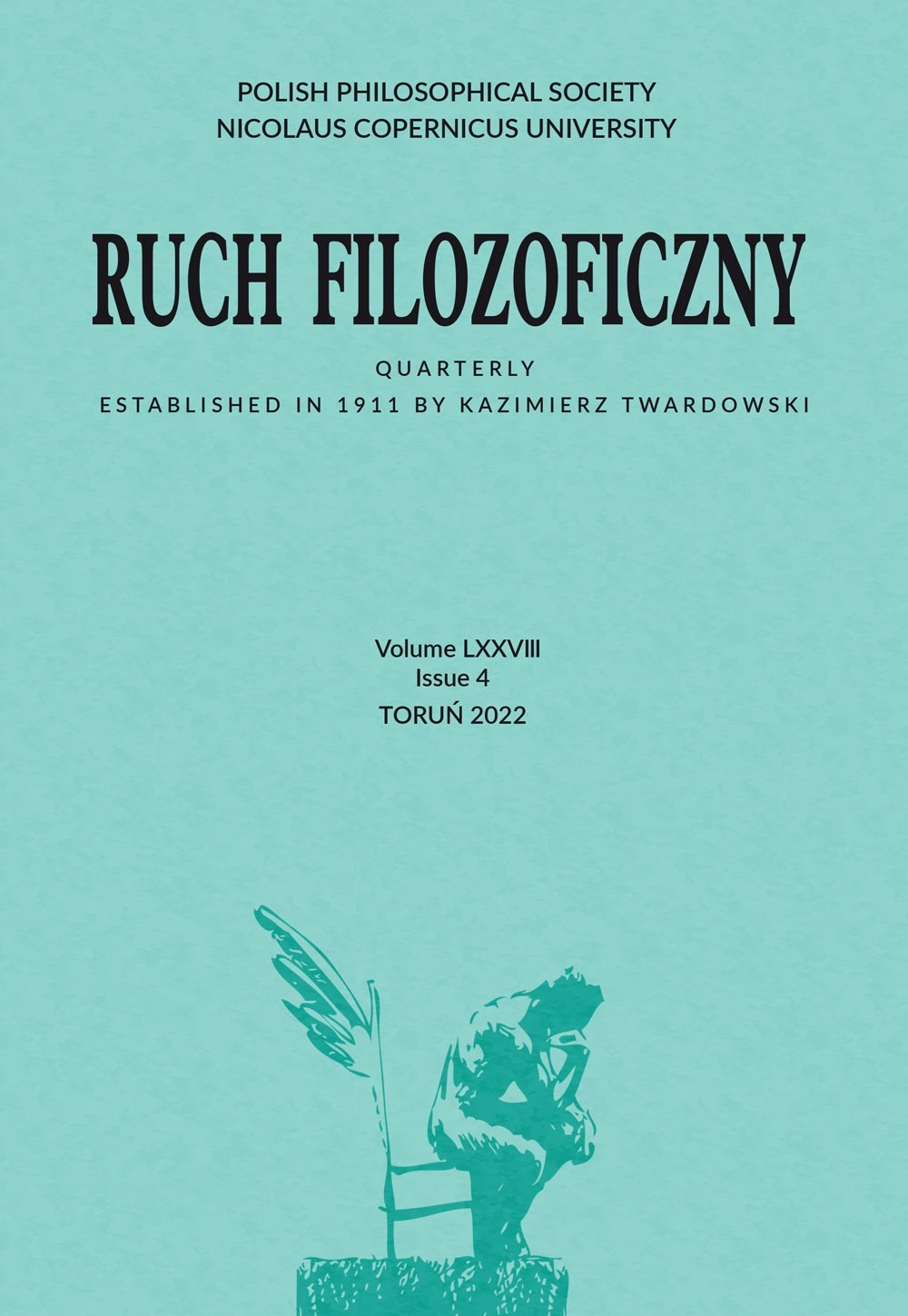Filter Bubbles, Echo Chambers and Shared Experience: Dewey’s Conception of the Public in the Digital Age
DOI:
https://doi.org/10.12775/RF.2022.029Słowa kluczowe
filter bubble, echo chamber, digital democracy, democratic public, John DeweyAbstrakt
This article explores what John Dewey’s political philosophy can offer in regard to the current crisis in digital democracy. It focuses on two digital mechanisms, the “filter bubble” and the “echo chamber”. While there is a prominent, Dewey-inspired debate on “digital publics” in the literature, a reconstruction of the Deweyan concepts of the public and of shared experience shows that it does not adequately reflect the aspect of situated and embodied experience. Based on this, it is shown that digital media offerings must also be rooted in local contexts of experience in order to answer the challenge of those two problematic mechanisms.Bibliografia
Alterman Eric. 2008. “Out of Print.” New Yorker, 24.03.2008. Access 15.06.2022. https://www.newyorker.com/magazine/2008/03/31/out-of-print.
Antić Andreas. 2018. Digitale Öffentlichkeiten und intelligente Kooperation: Zur Aktualität des demokratischen Experimentalismus von John Dewey. Potsdam: Universitätsverlag Potsdam. https://doi.org/10.25932/publishup-41096.
Antić Andreas. 2020. “Öffentlichkeit im digitalen Wandel. Zur Aktualität von John Deweys Öffentlichkeitstheorie.” In: Digitale Transformationen der Öffentlichkeit, ed. Jan-Philipp Kruse, Sabine Müller-Mall, 19–27. Weilerswist: Velbrück Wissenschaft. https://doi.org/10.5771/9783748911760.
Chow Ken Q Joel. 2013. “The Internet and the Democratic Imagination: Deweyan Communication in the 21st Century.” Contemporary Pragmatism 10(2): 49–78.
Coulter Bob. 2018. “Preserving Rich Experience in the Digital Age.” In: Dewey and Education in the 21st Century, ed. Ruth Heilbronn, Christine Doddington, Rupert Higham, 21–35. Bingley: Emerald Publishing Limited. https://doi.org/10.1108/978-1-78743-625-120181008.
Crick Nathan. 2009. “The Search for a Purveyor of News: The Dewey/Lippmann Debate in an Internet Age.” Critical Studies in Media Communication 26(5): 480–497. https://doi.org/10.1080/15295030903325321.
Dewey John. 1981. The Later Works, Volume 1: 1925, Experience and Nature, ed. Jo Ann Boydston. Carbondale: Southern Illinois University Press.
Dewey John. 1983. The Middle Works, Volume 13: 1921–1922, ed. Jo Ann Boydston. Carbondale: Southern Illinois University Press.
Dewey John. 1983. The Middle Works, Volume 14: 1922, ed. Jo Ann Boydston. Carbondale: Southern Illinois University Press.
Dewey John. 1984. The Later Works, Volume 2: 1925–1927, ed. Jo Ann Boydston. Carbondale: Southern Illinois University Press.
Dewey John. 2008. The Later Works, Volume 14: 1939–1941, ed. Jo Ann Boydston. Carbondale: Southern Illinois University Press.
Faris Robert M., Hal Roberts, Bruce Etling, Nikki Bourassa, Ethan Zuckerman, Yochai Benkler. 2017. Partisanship, Propaganda, and Disinformation: Online Media and the 2016 U.S. Presidential Election. Cambridge, Massachusetts: Berkman Klein Center for Internet & Society at Harvard University. http://nrs.harvard.edu/urn-3:HUL.InstRepos:33759251.
Farrell Henry. 2014. “New Problems, New Publics? Dewey and New Media: New Problems, New Publics? Dewey and New Media.” Policy & Internet 6(2): 176–191. https://doi.org/10.1002/1944-2866.POI363.
Gachau James. 2018. “The Role of Social Media in Participatory Democracy: A Case Study of Three Facebook Groups.” PhD diss., University of Maryland. https://doi.org/10.13016/M2XD0R173.
Gayman Cynthia. 2008. “Words, Power, Pluralism: Are You Talking to Me?”. Journal of Speculative Philosophy: A Quarterly Journal of History, Criticism, and Imagination 22(2): 82–91.
Gorodnichenko Yuriy, Tho Pham, Oleksandr Talavera. 2021. “Social Media, Sentiment and Public Opinions: Evidence from #Brexit and #USElection.” European Economic Review 136 (July): 103772. https://doi.org/10.1016/j.euroecorev.2021.103772.
Groshek Jacob, Karolina Koc-Michalska. 2017. “Helping Populism Win? Social Media Use, Filter Bubbles, and Support for Populist Presidential Candidates in the 2016 US Election Campaign.” Information, Communication & Society 20(9): 1389–1407. https://doi.org/10.1080/1369118X.2017.1329334.
Grunwald Armin, Gerhard Banse, Christopher Coenen, Leonhard Hennen. 2005. “Internet und Demokratie. Analyse netzbasierter Kommunikation unter kulturellen Aspekten.” TAB working report. Berlin: Büro für Technikfolgen-Abschätzung beim deutschen Bundestag.
Hermida Alfred, David Domingo, Ari Heinonen, Steve Paulussen, Thorsten Quandt, Zvi Reich, Jane Singer, and Marina Vujnovic. 2011. “The Active Recipient: Participatory Journalism Through the Lens of the Dewey-Lippmann Debate.” Journal of the International Symposium on Online Journalism 1(2): 129–152.
Jacobsen Lenz. “Corona-Epidemie: Unsere unsichtbaren Toten.” Die Zeit, 24.05.2020. Access 15.06.2022. https://www.zeit.de/gesellschaft/zeitgeschehen/2020-05/corona-epidemie-opfer-covid-19-infizierte-verstorbene-leid-sichtbarkeit.
Josephi Beate. 2016. “Digital Journalism and Democracy.” In: The Sage Handbook of Digital Journalism, ed. Tamara Witschge. 9–25. London: Sage.
Nelson Jacob L., James G. Webster. 2017. “The Myth of Partisan Selective Exposure: A Portrait of the Online Political News Audience.” Social Media + Society 3(3): 1–13. https://doi.org/10.1177/2056305117729314.
Nguyen C. Thi. 2020. “Echo Chambers and Epistemic Bubbles.” Episteme 17(2): 141–161. https://doi.org/10.1017/epi.2018.32.
Niesyto Johanna. 2008. “Europäische Öffentlichkeit im Internet.” Navigationen – Zeitschrift für Medien- und Kulturwissenschaften 8(2): 27–47.
Pariser Eli. 2012. The Filter Bubble: What the Internet Is Hiding from You. London: Penguin Books.
Persily Nathaniel. 2017. “Can Democracy Survive the Internet?”. Journal of Democracy 28(2): 63–76. https://doi.org/10.1353/jod.2017.0025.
Rölli Marc. 2017. “Kontinuum der Qualitäten.” In: John Dewey, Erfahrung und Natur, ed. Michael Hampe, 113–126. Klassiker auslegen, Band 66. Berlin: De Gruyter.
Shusterman Richard. 2008. Body Consciousness: A Philosophy of Mindfulness and Somaesthetics. Cambridge; New York: Cambridge University Press.
Westbrook Robert Brett. 1991. John Dewey and American Democracy. Ithaca, New York: Cornell University Press.
Weydner-Volkmann Sebastian. 2018. Moralische Landkarten der Sicherheit: Ein Framework zur hermeneutisch-ethischen Bewertung von Fluggastkontrollen im Anschluss an John Dewey. Baden-Baden: Ergon Verlag. https://doi.org/10.5771/9783956503788.
Pobrania
Opublikowane
Jak cytować
Numer
Dział
Licencja
Prawa autorskie (c) 2023 Sebastian Weydner-Volkmann

Utwór dostępny jest na licencji Creative Commons Uznanie autorstwa – Bez utworów zależnych 4.0 Międzynarodowe.
Statystyki
Liczba wyświetleń i pobrań: 878
Liczba cytowań: 0



